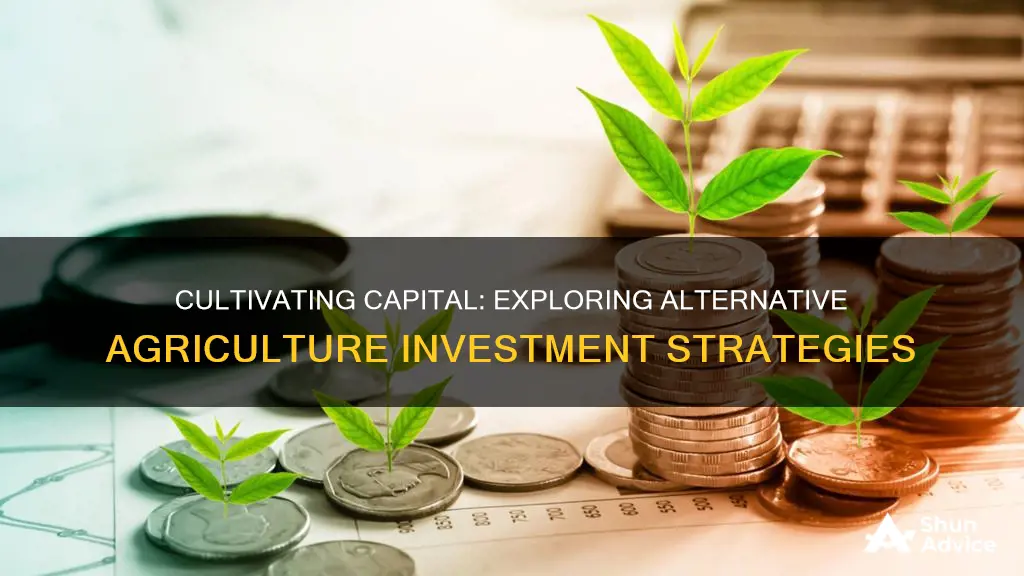
There are several ways to invest in agriculture without buying a farm. These include investing in agricultural stocks, farmland mutual funds and ETFs, and crowdfunding platforms.
Agricultural stocks can include companies involved in crop production, agricultural equipment manufacturing, and fertilizer production and distribution. Examples of widely held agricultural stocks include Archer-Daniels-Midland, Corteva, and Scotts Miracle-Gro.
Farmland mutual funds and ETFs allow investors to pool their money into activities that support the agriculture industry. It's important to note that farmland mutual funds may not invest exclusively in agriculture and often invest in adjacent sectors. An example of a farmland mutual fund is the Fidelity Agricultural Productivity Fund, which aims to invest 80% of its assets in agricultural productivity companies.
Crowdfunding platforms like AcreTrader, FarmTogether, and FarmFundr allow investors to buy a small slice of a real farm, significantly lowering the minimum investment. These platforms typically handle everything from land selection to income distribution.
Other ways to invest in agriculture without buying a farm include purchasing land directly and renting it to farmers, investing in real estate investment trusts (REITs) that focus on farmland, and investing in commodities through futures contracts.
| Characteristics | Values |
|---|---|
| Diversification from traditional assets | Farms produce essential commodities, which typically provide some protection from inflation |
| Sources of returns | With so many asset classes connected to farmland, you can choose which type of exposure you want |
| Overview of Farmland | Farms are crucial because they grow many precious commodities we use daily for food, drinks and clothing |
| Farmland REITs | Farmland Partners Inc. (FPI) and Gladstone Land Corporation (LAND) |
| Agricultural stocks | Archer-Daniels-Midland (ADM), Corteva (CTVA) and Scotts Miracle-Gro (SMG) |
| Farmland mutual funds and ETFs | Fidelity Agricultural Productivity Fund (FARMX) |
| Crowdfunding platforms | AcreTrader, FarmTogether and Farmfundr |
What You'll Learn

Invest in a farming-focused real estate investment trust (REIT)
Investing in a farming-focused real estate investment trust (REIT)
A farming-focused real estate investment trust (REIT) is a company that owns and manages farmland properties and generates revenue by leasing the land to farmers. REITs are an excellent way to invest in farmland without buying a farm, as they are publicly traded like any other stock and are therefore very liquid and easily accessible for investors.
Advantages of investing in farmland REITs
- Portfolio diversification: Farmland offers investors uncorrelated returns compared to other major asset classes such as stocks, bonds, and cryptocurrencies, making it an excellent way to diversify a portfolio and help reduce its overall volatility.
- Inflation hedge: Historically, farmland has offered a better hedge against inflation than stocks, bonds, and gold. There has been about a 70% correlation between US farmland values and the consumer price index.
- Attractive total returns: Farmland provides investors with two sources of returns: rental income and capital appreciation. From 1992 to 2021, the combined average annual return was 11%.
Risks of investing in farmland REITs
- Interest rate risk: Rising interest rates make it more expensive for REITs to borrow money, which can affect their ability to make acquisitions. REIT valuations also tend to fall during periods of rising interest rates.
- Natural disasters: Droughts, wildfires, insect infestations, and other natural disasters can affect a farm's harvest and ability to pay rent.
- Crop prices: Crop prices, especially for annual commodity crops such as corn, soybeans, and wheat, can be very volatile and affect farm income.
- Farmer-tenants: Farming has been a challenging business due to natural disasters, crop prices, equipment costs, labour costs, debt, and other issues. If farmers run into financial trouble, they may not be able to make their rental payments.
Examples of farmland REITs
- Gladstone Land Corp. (NASDAQ: LAND): This McLean, Virginia-based specialty REIT owns farmland and related properties in major US agricultural markets and leases or leases back its properties to farmers. About 40% of Gladstone Land's acreage is used for organic produce.
- Farmland Partners Inc. (NYSE: FPI): Farmland Partners is a Denver-based, internally managed specialty REIT that invests in farmland and originates loans to farmers that are secured by farm real estate. Farmland Partners owns and/or manages over 340 farms totalling 190,200 acres in 20 states.
Impeachment Impact: Navigating Investments Through Political Turmoil
You may want to see also

Invest in companies that sell fertilizer and seeds
Investing in agriculture can be a strategic move as people need to eat regardless of the state of the economy. As the world's population increases, farming will play an increasingly important role in sustaining global societies.
One way to invest in agriculture without buying a farm is to invest in companies that sell fertilizer and seeds. Many firms are involved in the production and sale of these products, and investors should determine how much of each firm's revenue is derived from agriculture, as some also service other sectors.
- Nutrien Limited (NTR): One of the world's largest fertilizer producers, Nutrien is a Canadian company that provides crop inputs and services. It operates in four segments: Retail, Potash, Nitrogen, and Phosphate. Nutrien has a solid dividend yield and appears to be a great value. It has a one-year price target of $67.96 and receives a "buy" or "strong buy" rating from several analysts.
- The Mosaic Co. (MOS): Mosaic is a mine-to-market company engaged in crop nutrition. It produces and distributes millions of tons of potash and phosphate fertilizers annually for a global customer base. While most analysts have a "hold" rating on the stock, the average 12-month price target is about 15% above current levels.
- CF Industries Holdings Inc. (CF): CF Industries is a leading manufacturer of hydrogen and nitrogen products, with manufacturing complexes in the U.S., Canada, and the U.K. It aims to provide clean energy and sustainable products by reducing reliance on limited supplies of natural nitrogen deposits. The stock has seen strong returns over the past year and three years, outperforming the S&P 500.
- Scotts Miracle-Gro Company (SMG): Scotts Miracle-Gro is one of the original American fertilizer companies, dating back to 1868. It is now the world's largest marketer of branded consumer lawn and garden products. The company pays a hefty dividend and has a presence in the U.S., Europe, Canada, and Asia Pacific. While the stock has performed well over the past year, it has seen significant losses over the past three years.
- Corteva Inc. (CTVA): Corteva Agriscience is dedicated solely to agriculture and was spun off from DowDuPont in 2019. The company offers crop protection products, seed products, and digital tools and services. Corteva has met or exceeded analyst earnings expectations for the last four quarters. It has seen positive returns year-to-date and over the past three years.
- Bioceres Crop Solutions Corp. (BIOX): Bioceres provides crop productivity technologies, including digital decision-making solutions, to support agriculture's transition to carbon neutrality. Although the company is not yet profitable, analysts are bullish on the stock, expecting it to more than double in value over the next 12 months.
By investing in companies that sell fertilizer and seeds, you can gain exposure to the agriculture sector without owning a farm. Remember to carefully research each company and consider factors such as performance, market cap, price-earnings ratio, dividend yield, and analyst ratings before making any investment decisions.
Restaurant Investment: Worth the Risk?
You may want to see also

Invest in farm equipment manufacturers
Investing in farm equipment manufacturers is a great way to gain exposure to the agriculture sector without buying a farm. Farming is an equipment-intensive activity, and with advances in technology, the right machinery can make farming more efficient. As such, there is a growing market for agricultural equipment, and investors can benefit from this by investing in equipment manufacturers with an agricultural focus.
There are several well-known companies that produce farm equipment, and investors can gain exposure to the sector by investing in these manufacturers. Two of the biggest companies involved in farming equipment are Deere & Co. (DE) and AGCO Corp. (AGCO). Deere & Co. is the most popular, largest, and one of the oldest agricultural equipment manufacturers. In 2017, the company was rated as the largest farm machinery-producing company. AGCO, meanwhile, has spent over $20 million in recent years developing an ideal combine.
Other notable farm equipment manufacturers include:
- MTZ (Minsk Tractor Factory), a major supplier of tractors in North America, Europe, and other parts of the world.
- New Holland, one of the oldest manufacturers, known for its durable and versatile tractors, as well as for developing a methane-powered tractor.
- ASI, a company focused on robotics and autonomous alternatives to traditional farming challenges, including an autonomous tractor.
- Kuhn, an American company specialising in mixers, spreaders, and tillage and hay parts, with a focus on precision fertiliser spreaders.
- Oliver Farm Equipment Company, an American manufacturer of farm inputs since 1929.
- Alamo Group, Inc., a manufacturer of tillage tools, cutting parts, tractor attachments, and other machinery, with nine subsidiaries.
- Kubota, a Japanese company known for the M7002 series tractor and its seeding, sowing, planting, and ploughing attachments.
- CLAAS, a German manufacturer of mowers, combines, tractors, forage harvesters, and other large agricultural machines. CLASS is a world best-selling forage harvester manufacturer.
By investing in these companies, investors can benefit from the growing demand for agricultural equipment without the need to purchase a farm directly.
Large Loans or Investments: Where Should Your Money Go?
You may want to see also

Invest in crop distributors and processors
Investing in agriculture can be a good strategic move, as it is often regarded as being recession-proof. As the world's population increases, farming will play an increasingly important role in sustaining global societies.
One way to invest in agriculture without buying a farm is to put your money behind crop distributors and processors. These companies provide the infrastructure that moves crops from the farm to the local grocery store. They transport, process, and distribute crops.
Some of the companies that fall into this category include Archer Daniels Midland Co. (ADM) and Bunge Limited (BG). As with other agricultural companies, some of these distributors only derive a portion of their revenues from agriculture-related activities.
When investing in crop distributors and processors, it is important to carefully consider the risks and rewards. These companies may be impacted by factors such as fluctuating climate conditions, volatile commodity prices, geopolitical events, global trade policies, and domestic regulatory and environmental considerations.
Additionally, it is worth noting that there are a limited number of publicly traded crop production firms. However, by investing in crop distributors and processors, you can gain exposure to the agriculture sector and potentially reap the benefits of diversification and steady returns.
How to Legally Invest for Others
You may want to see also

Invest in commodities through futures contracts
Investing in commodities through futures contracts is a way to gain exposure to agricultural products without owning a farm. A futures contract is a legally binding agreement to buy or sell a predetermined amount of a commodity at a specific price on a specific date in the future. This strategy allows investors to bet on the price of agricultural goods without actually buying stock in a farming company.
Commodity futures contracts are typically used by commercial enterprises that depend on commodities for their business activities. For example, a cereal company might buy wheat futures to secure prices, while an airline might purchase energy futures. Some sophisticated investors also trade commodity futures, hoping to profit from changes in the price of a futures contract without ever owning the contract or dealing with the physical commodity.
Commodity futures can be traded through brokers or on exchanges. They are often traded on margin, meaning that only a fraction of the total trade amount needs to be placed with the broker handling the account. This allows for a high degree of leverage, which can amplify gains and losses. It is important to note that speculating on futures is an advanced trading strategy and not suitable for most investors due to the high risk involved.
Before investing in commodity futures, it is crucial to understand the risks and do your due diligence. The Commodity Futures Trading Commission (CFTC) regulates the commodity futures market in the US, and anyone trading futures with the public or giving advice about futures trading must be registered with the National Futures Association (NFA). It is also important to consider your financial experience, goals, and resources, as well as the obligations and risks associated with any contract you are considering.
Retiring Rich: Navigating the $1 Million Milestone
You may want to see also
Frequently asked questions
Investing in farmland can provide a steady income stream through rent yields and increases in farmland values. It has historically produced solid returns, outperforming other asset classes like the S&P 500 and gold. Farmland also serves as a hedge against inflation and offers diversification benefits due to its low correlation with the stock market.
There are several ways to invest in farmland indirectly, such as through real estate investment trusts (REITs), agricultural stocks, mutual funds or exchange-traded funds (ETFs), and crowdfunding platforms. These options offer lower minimum investments, diversification, and exposure to the agriculture sector without the challenges of direct farm ownership.
Farmland Partners Inc. (FPI) and Gladstone Land Corporation (LAND) are two of the largest farmland REITs in the US. They acquire farmland and lease it to farmers, providing investors with regular income through dividends.
Examples include Archer-Daniels-Midland (ADM), Corteva (CTVA), Scotts Miracle-Gro (SMG), Nutrien Limited (NTR), and Deere & Co. (DE). These companies are involved in various aspects of the agriculture industry, such as crop production, equipment manufacturing, and fertilizer production.
Investing in agriculture carries certain risks, including weather conditions, volatile commodity prices, geopolitical events, and regulatory changes. These factors can impact crop yields and farm incomes, leading to variability in investment returns. Therefore, it is essential for investors to carefully consider these risks before investing in the agriculture sector.







